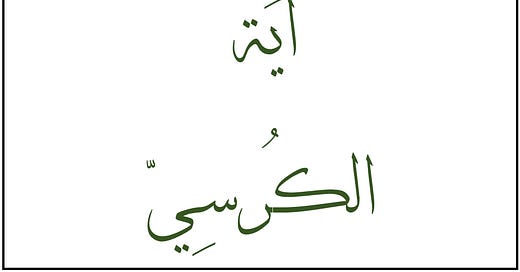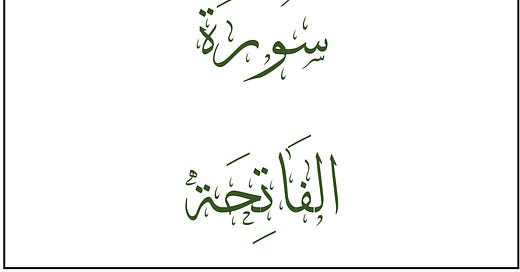

Discover more from Heavenly Order
Sūrat al-Mulk
Observations on how the sūrah the Messenger ﷺ recited each night is organized and structured.
Sūrat al-Mulk (The Dominion) is significant in that the Messenger ﷺ encouraged us to recite it every night before going to sleep. It is a Makkan sūrah which is said to protect the one who recites it from the punishments of the grave and to intercede on one’s behalf on the Day of Judgment.
It has been observed that on a macro-level, the sūrah appears to display a mirror composition.1
CONNECTIONS
[A]/[A’] - Allah ﷻ begins the sūrah describing His power and might. He informs us that He “created death and life” which correlates to the ending wherein He commands the Messenger ﷺ to say, “whether Allah destroys me and those with me or shows us mercy.” Thus, “death” is connected to “destroys” and “life” with “mercy”.
After His creation of death and life, Allah ﷻ mentions two of His names, “the Authority” and “the Forgiving.” In [A’], Allah commands the Messenger ﷺ to say, “Who will save the disbelievers from a painful punishment?” Who has the power to administer punishment? The Authority. And who can save them? The Forgiving. In other words, this may be a subtle hint to the disbelievers to accept the Authority and the Forgiving in this life to avoid the impending punishment in the next life.
In [A], Allah ﷻ says, “You will never see any imperfection in the creation of ar-Raḥmān (the Most Compassionate)". Those who accept this premise end the sūrah saying, “He is ar-Raḥmān—in Him alone we believe, and in Him alone we trust.”
Finally for this section, Allah ﷻ says, “You will see nothing out of proportion in the creation of the Most Compassionate. So, cast your eye again. Do you see any rifts?” Allah ﷻ twice uses the Arabic word, “tarā”, for “seeing” in this āyah. Then, in [A’], Allah ﷻ says on two occasions, “Did you see…?” using a verb from the same Arabic root letters, “ra’aytum”. Allah ﷻ begins with telling us to look at the creation twice, and then concludes by twice asking us, “Did you see…?”
In summary, Allah ﷻ mentions His control over all dominion, His ability to create life, death, and the perfect skies above us. This is in contrast to humans (Section [A’]) who are weak in their abilities. Allah ﷻ can destroy us in an instant or cause us to die when He wants. Opposite of Allah ﷻ, Who is in complete control, humans cannot control something as simple as water if we were to lose possession of it.
[B]/[B’] - [B] is the most elaborate description of the unseen and afterlife in this sūrah. It provides us details of Heaven and Hell and reminds us of our inevitable resurrection. It is Allah’s promise of what is to come. [B’] then quotes the arrogant disbelievers asking, “When is this promise in you were being truthful?”
Connecting back to [A], Allah ﷻ has absolute power, and with it He created Heaven and Hell. Meanwhile, the weak human hears about these things and still has the audacity to ask, “When is it? When is the resurrection so I can see these ‘amazing’ things you describe?”
In [B], Allah ﷻ quotes the guardians of Hell asking the denizens of Hell, “Had no nadhīr (warner) come to you?” And the disbelievers will reply, “Yes, a nadhīr had come to us, but We had rejected [him].” In contrast, in [B’], the Messenger ﷺ is told to say, “I am only a plain nadhīr.”
In [B], the regret of the disbelievers is quoted as, “If only we had listened and reasoned, we would not be among the residents of the Blaze!” In [B’] we’re told that, “Then when they see the torment drawing near, the faces of the disbelievers will become gloomy.” They only needed to listen and think to avoid seeing the punishment.
[C]/[C’] - At the center Allah ﷻ first details the immediate threats that He may unleash on us before we are even dead, let alone resurrected in [C]. To contrast this, Allah ﷻ reminds us of our mortality and relatively short lifespans in [C’]. With such threats only being held back by Allah’s control, the human is made to reflect on how soon they may die if Allah ﷻ wills it.
In [C], Allah ﷻ asks if we are not afraid that He might “cause al-‘arḍ (the earth) to swallow you up.” In contrast, in [C’], Allah ﷻ says that He “has multiplied you throughout al-‘arḍ.”
If we go through the questions Allah ﷻ brings in [C], we will find an interesting trend. First He asks two hypotheticals; “Do you feel secure that the One Who is in heaven will not cause the earth to swallow you up?” and “Do you feel secure that the One Who is in heaven will not unleash upon you a storm of stones?” As hypotheticals, these questions are asking us to listen closely to the warnings.
Next Allah ﷻ asks, “Have they not seen the birds above them, spreading and folding their wings?” This question encourages us to see the example.
The following questions ask, “Which army will come to your help instead of the Most Compassionate?” and “Who is it that will provide for you if He withholds His provision?” These are also hypothetical questions pointing towards our ability to listen to the examples.
And finally, Allah ﷻ concludes [C] with the question, “Who is guided: the one who crawls face-down or the one who walks upright on the Straight Path?” This visual example encourages us to use our sight.
In summary, [C] may be organized as follows:
One who heeds these warnings should be affected in their heart. [C’] immediately follows this up with, “Say, ‘He is the One who has originated you, and made for you ears and eyes and hearts. How little you pay gratitude!’” In other words, “I already gave you all the faculties you needed to benefit from this reminder.”
And Allah ﷻ knows best.
Ali Khan, Nouman. “06. Al-Mulk - A Deeper Look” Bayyinah TV, https://www.bayyinahtv.com/video/3812
Subscribe to Heavenly Order
Exploring the Divine Structure and Coherence of the Quran. Join us as we dismantle the myth of the "disjointed" and "random" organization of Islam's Revealed Text.

















